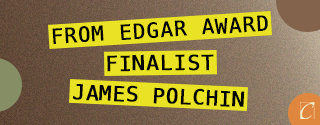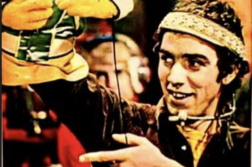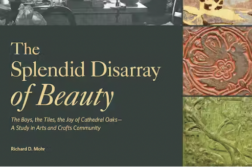
New Zealand—or Aotearoa, in Te Reo, the indigenous Māori language—is a great place to be gay. They legalized civil unions in 2005, and same-sex marriage in 2013. The UCLA law school’s Williams Institute listed the country tenth on its 2021 LGBTI Global Acceptance Index, and the 2024 Spartacus Gay Travel Index ranked it first.
However, these isles were not always a haven in the South Pacific’s sparse gayborhood. For most of its colonial history, New Zealand followed Britain’s criminal code, which punished “buggery” with imprisonment. The first gay novel written by a New Zealander in 1959, A Way of Love by James Courage, was banned for its depiction of male-male love. Others, such as Mitch Walker’s 1977 Men Loving Men, were banned for encouragement of “homosexual activity.”
Not until 1986, when the Homosexual Reform Act was passed, was consensual sex between men, and anal sex regardless of gender, legal. Even so, the legislation passed narrowly (49-44) and faced acrimonious resistance. A particularly vehement opponent of the Act was the conservative National Party member Norman Jones. In 1985 he shrieked at the Wellington Town Hall that the queer community should “go back into the sewers where [you came]from” and yelled, “You’re looking into Hades! You’re looking at the homosexuals! Don’t look too hard: you might catch AIDS!”
The New Zealand playwright Robert Lord kept eight diaries throughout much of this time, from 1974 to 1991, shortly before his death from an AIDS-related illness in 1992. His diaries, published last year by the University of Otago Press in Dunedin, are fascinating, not least because the editors have reduced his original 160,000 words to about 90,000, creating an exquisite volume of scholarship, edited into a compelling narrative with photographs, a complete index, and illuminating footnotes.
Lord was one of New Zealand’s leading playwrights and the author of more than 20 plays for radio, television and stage, among them Well Hung, Bert & Maisy, and his posthumous hit Joyful and Triumphant. Born in 1946 in Rotorua, he left New Zealand— “a third-world backwater,” he writes nastily, for the USA in 1974— not returning for good until 1989. While much of his plays show Lord to be an astute observer of New Zealand’s cloistered domestic life, recent critics argue they reveal a subversive consciousness that cultivated a queer perspective at a precarious time. Lord spent much of his writing career in New York City. His observations and judgments amount to a spyglass trained on vanished worlds: the glitter and garbage of 1980s New York, partying on the edge of the AIDS abyss; and the corseted New Zealand cities, suburbs, and theater world of the same era.
In New York, the William Morris agency represented Lord, and a number of his plays appeared off-Broadway or in regional repertory theaters. He ran with a crowd that included David Bowie, Marc Jacobs, and Iggy Pop. Meryl Streep and Kevin Bacon acted in his plays. Bob Balaban directed them. He rewrote a few of his New Zealand works for the American scene. Well Hung, a smash hit in New Zealand, for example, became Country Cops and played at the Trinity Square Repertory in Rhode Island. Journalist Paula Mann dubbed him “Broadway’s best-kept secret” in 1983.
Lord was devoted to New York, despite the financial hardship that forced him to work as a realtor, a typesetter, and a cleaner of cottages on Fire Island (or “Isle de Flambé,” as he called it). He had more commercial disappointment than triumph. Still, he “pigged out on the balcony” at the Saint, and was “plunged quite pleasantly” at the St. Marks Baths, waking up the next day feeling “like shit and somewhat suicidal.”
The diaries also offer a portrait of the artist as a voyager caught between worlds. As he writes, “I am not now & never will be an American but I have ceased to be a New Zealander.” He dwells in New York, but is not of it. New Zealand is home, even though his visits are filled with ambivalence and dislocation. As he describes, kiwi men dress “to deny any sexuality,” and “being gay in a country that prizes above all rude masculinity doesn’t make life simple…” An abandoned opera house surrounded by fields is “a terrible anomaly lost in a world of carrots.”
Perhaps the most heartbreaking notes Lord makes to himself are when he knows he has contracted AIDS, or “gay cancer.” He returns to Dunedin in 1987 and buys a brick cottage—the “smallest house in the southern hemisphere.” This would become the Robert Lord Writers Cottage, a place for writers to work rent-free. Dunedin, he accurately writes, is “melancholic” and “like visiting your grandmother.” But he liked it. It was home. It was where he would die. “I find there is no one I can tell my story to. Or maybe I don’t want to tell it.” A month later, “Am screaming inside. Suddenly petrified….‘I’m dying. I’m dying. I’m dying’ keeps going through my head.” He worries his mother Bebe will be ashamed of him. In late October 1989, he makes the brutal pronouncement: “…I’ll never know intimacy again.”
Now, more than thirty years after Lord’s death, his status as a “gay playwright” speaks for itself. While Lord, in such plays as Bert & Maisy or his greatest success, Joyful & Triumphant, superficially comes across as the satirical bard of the New Zealand domestic scene, contemporary critics see another playwright. Academic James Wenley and playwright Nathan Joe write that Lord’s work is “overdue a queer re-reading,” and New Zealand actor and director Shane Bosher writes that Lord’s “articulation of gay experience shows extraordinary courage and defiance.”
While none of Lord’s work is as explicit as, say, Boys in the Band, some furtive flashes radiate through. The middle-aged parents of Balance of Payments live off the earnings of their rent-boy son, until his mother, who also knits him woolen underwear to pose in, kills him for earning too little. Meeting Place includes pared-down but intense same-sex touching, massaging (while discussing gay-bashing, in one scene), and dialogue, opening up the possibilities of non-heteronormative intimacy. Even Bert & Maisy, a popular drama that was adapted for television, includes a stranger picked up by curious but staid Bert at a public toilet. The stranger’s queerness is expressed through his love of coffee and good wine (not the accepted tea and beer) and his love of travel.
One of Lord’s many unfulfilled projects was to turn a portion of these diaries into a “non-fiction epistolary novel” of “letters real and unsent” called the “Goodbye Book.” He never published this valedictory volume. Instead, he left his diaries with a library, the Hocken Collections in Dunedin. For many readers in New Zealand and abroad, they represent a “Hello Book,” an introduction to this charming man and prolific and daring writer. We are fortunate he passed them along to us.
 Eric Trump is a writer and translator living in Dunedin, New Zealand, where he also teaches medical humanities at the University of Otago.
Eric Trump is a writer and translator living in Dunedin, New Zealand, where he also teaches medical humanities at the University of Otago.






